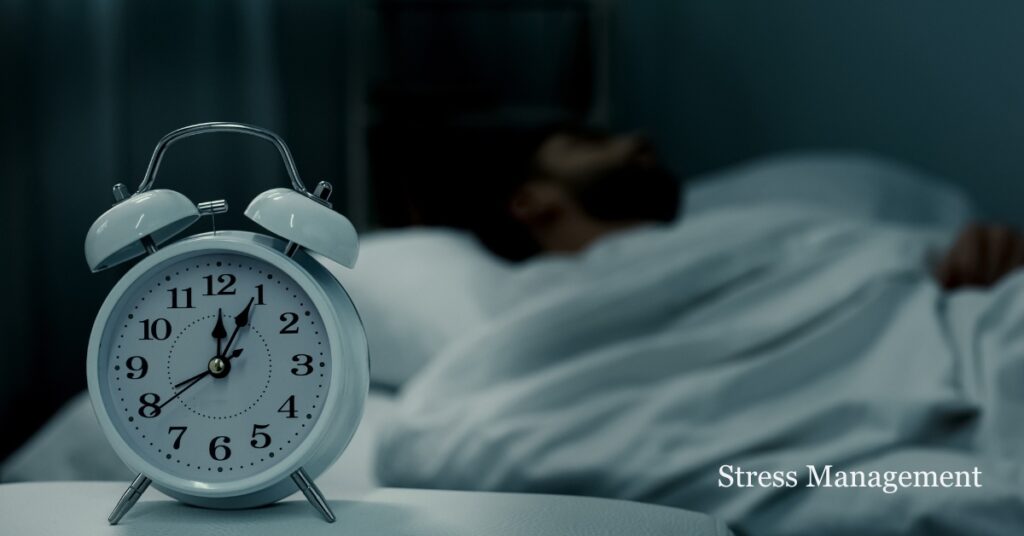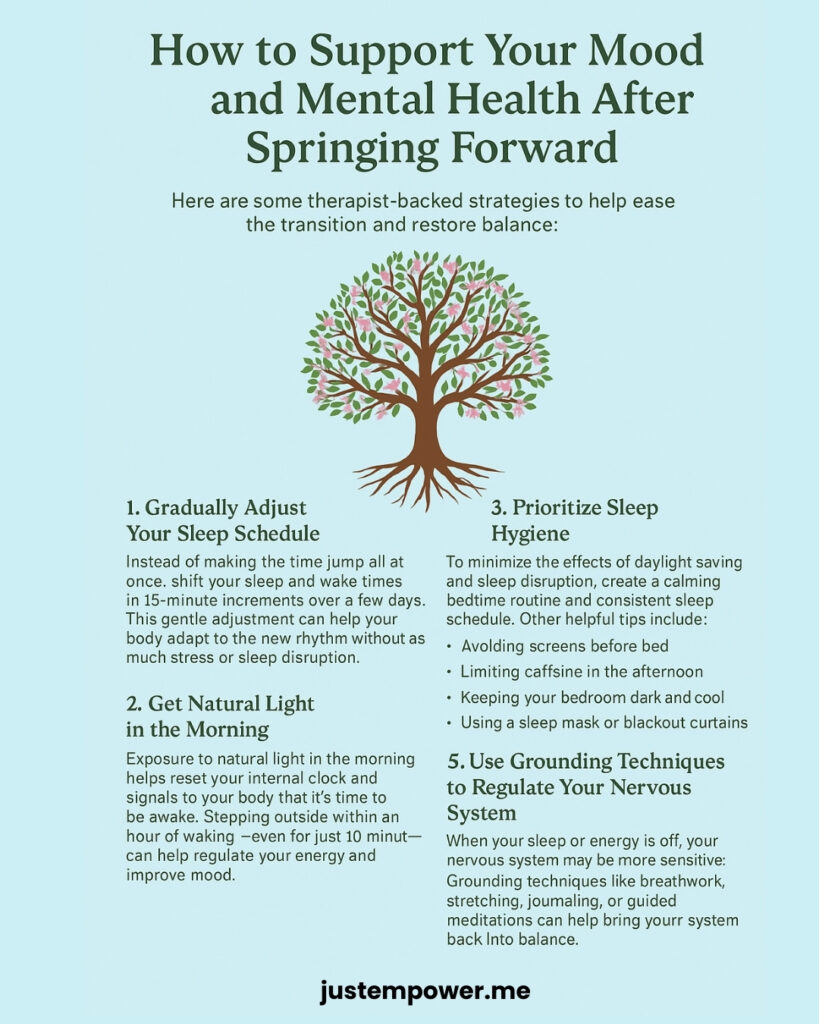Every spring, we “spring forward” by setting our clocks ahead one hour for Daylight Saving Time (DST)– unless you’re one of the lucky ones that lives in Arizona! While this shift may seem small, losing just one hour of sleep can have a surprisingly big impact on your mood, sleep patterns, and overall mental health—especially for young adults already managing stress, anxiety, or burnout.
In this post, we’ll explore how daylight saving impacts sleep, insomnia, and overall health, and offer therapist-approved strategies to help you navigate this seasonal shift with more ease and balance.

What Is Daylight Saving, and Why Does It Affect Us?
Daylight saving was originally introduced to make better use of natural daylight during the longer spring and summer days. While it’s a common myth that farmers supported daylight saving, they actually opposed it because their work depends on sunlight rather than the clock—many agricultural groups lobbied against its implementation.
But while we gain extra daylight in the evening, we also lose one hour of sleep, which can disrupt our body’s internal clock, known as the circadian rhythm.
This disruption can cause a range of issues, including insomnia, mood changes, and cognitive difficulties. In fact, multiple studies have shown a link between daylight saving and sleep disturbances, as well as daylight saving and heart attacks—suggesting this seemingly minor time shift can have major effects on our physical and mental health.
Common Mental Health Symptoms After the Spring Time Change
If you’ve been feeling “off” after daylight saving begins, you’re not alone. Some common mental and physical symptoms include:
- Trouble falling or staying asleep
- Waking up feeling groggy or unrested
- Increased anxiety or stress
- Low mood or irritability
- Difficulty concentrating or staying motivated
- Fatigue or emotional exhaustion
These symptoms are often tied to circadian rhythm disruption, which plays a key role in regulating your energy levels, emotions, and focus.
And if you have kids, adjusting to daylight savings can be even more stressful!
How Daylight Saving Affects Sleep, Insomnia, and Health
Daylight saving and insomnia often go hand-in-hand. Losing an hour of rest can throw off your natural sleep-wake cycle, especially for those who already have trouble sleeping or experience anxiety at bedtime.
Studies have also shown an increase in heart attacks and strokes following the spring time change. One theory is that the loss of sleep leads to increased stress and inflammation, making this transition especially risky for individuals with preexisting health conditions.
These findings highlight the broader connection between daylight saving and health, and why it’s important to take extra care of your body and mind during this time of year.
How to Support Your Mood and Mental Health After Springing Forward
Here are some therapist-backed strategies to help ease the transition and restore balance:
1. Gradually Adjust Your Sleep Schedule
Instead of making the time jump all at once, shift your sleep and wake times in 15-minute increments over a few days. This gentle adjustment can help your body adapt to the new rhythm without as much stress or sleep disruption.
2. Get Natural Light in the Morning
Exposure to natural light in the morning helps reset your internal clock and signals to your body that it’s time to be awake. Stepping outside within an hour of waking—even for just 10 minutes—can help regulate your energy and improve mood.
3. Prioritize Sleep Hygiene
To minimize the effects of daylight saving and sleep disruption, create a calming bedtime routine and consistent sleep schedule. Other helpful tips include:
- Avoiding screens before bed
- Limiting caffeine in the afternoon
- Keeping your bedroom dark and cool
- Using a sleep mask or blackout curtains
4. Slow Down and Practice Self-Compassion
Transitions are hard, even when they’re predictable. Be mindful of how your body and mood are responding to this shift. If you feel more tired, irritable, or anxious than usual, allow yourself extra rest and flexibility. You don’t need to push through at full speed—giving yourself space to adjust is part of self-care.
5. Use Grounding Techniques to Regulate Your Nervous System
When your sleep or energy is off, your nervous system may be more sensitive. Grounding techniques like breathwork, stretching, journaling, or guided meditations can help bring your system back into balance.

When to Seek Additional Support
If your symptoms last more than a few weeks or begin to affect your relationships, work, or quality of life, it may be time to reach out for professional help.
Therapy can offer support for those experiencing ongoing sleep issues, anxiety, depression, or seasonal mood changes—especially when tied to life transitions like daylight saving or stress overload.
Final Thoughts: Daylight Saving and Mental Health
Daylight saving and health are more closely connected than many people realize. From insomnia and mood swings to more serious concerns like heart attacks, this seasonal shift has real impacts on well-being.
With a little planning and intentional self-care, you can ease the transition and set yourself up for a more energized and emotionally balanced spring.
If you’re struggling with your sleep, energy, or emotional health, our therapy team is here to help. We work with young adults navigating life transitions, burnout, and anxiety—and we’d love to support you this season.
Reach out today to learn more or schedule a consultation.
